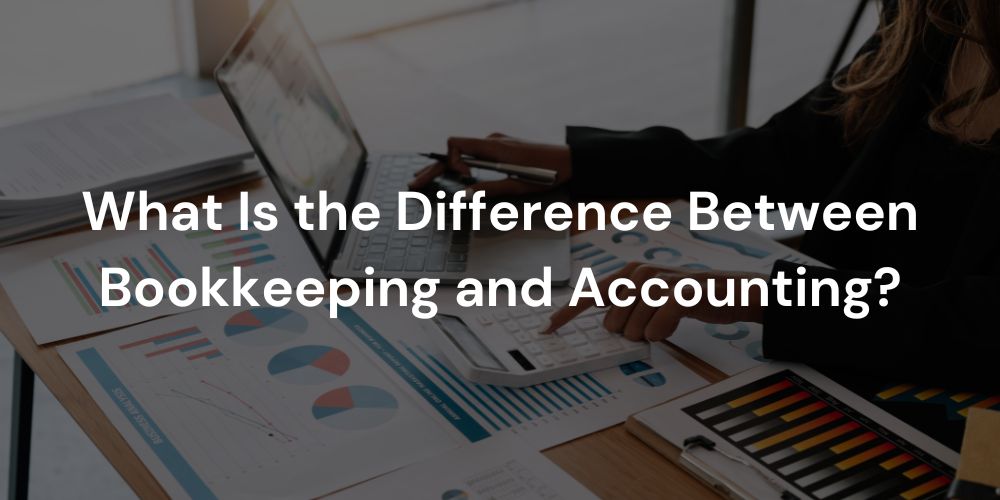What Is the Difference Between Bookkeeping and Accounting?


When most people think about the difference between bookkeeping and accounting, they find it difficult to distinguish between the two processes. While bookkeepers and accountants share common goals, they support your business in different stages of the financial cycle.
Bookkeeping is concerned with recording financial transactions and is more transactional and administrative. Accounting is more subjective, based on bookkeeping data, providing insights into your company’s financial health.
In this guide, we’ll clarify the functional differences between accounting and bookkeeping and the roles of bookkeepers and accountants.
The Function of Bookkeeping
Bookkeeping consistently records daily transactions and is an important component of acquiring the financial information required to manage a successful business.
Bookkeeping is comprised of the following:
- Recording financial transactions
- Posting debits and credits
- Producing invoices
- Preparation of financial statements (balance sheet, cash flow statement, and income statement)
- Maintaining and balancing subsidiaries, general ledgers, and historical accounts
- Completing payroll
One of the most important aspects of bookkeeping is keeping a general ledger. The general ledger is a basic document in which a bookkeeper records the sums received from sales and expenses. This is known as posting. The more sales performed, the more frequently the ledger is updated. A ledger can be made using specialist software, a computer spreadsheet, or a lined sheet of paper.
The complexity of an accounting system is frequently determined by the size of the firm and the amount of daily, weekly, and monthly transactions. All sales and purchases your company makes must be documented in the ledger, and certain goods require accompanying documentation. On its website, the IRS specifies which business transactions require supporting documentation.
Read more: 9 Best Bookkeeping Practices for Small Businesses
The Function of Accounting
Accounting is a high-level process that produces financial models using financial data acquired by a bookkeeper or business owner.
Accounting is a more subjective process than bookkeeping, which is primarily transactional.
Accounting is comprised of the following:
- Preparing to adjust entries (recording expenses that have occurred but aren’t yet recorded in the bookkeeping process)
- Reviewing company financial statements
- Analyzing costs of operations
- Completing income tax returns
- Aiding the business owner in understanding the impact of financial decisions
Analyzing financial data to assist you in making company decisions is an important element of the accounting process. As a result, you’ll have a greater knowledge of your company’s true profitability and cash flow. Accounting transforms information from the general ledger into insights that highlight the wider picture of the business and the company’s growth. Business owners frequently seek accountants to assist with strategic tax planning, financial analysis, forecasting, and tax filing.
Read more: Accounting Outsourcing Services: Pros and Cons
The Distinction Between a Bookkeeper and an Accountant
Bookkeepers and accountants undertake similar jobs but have different skill sets. Generally, a bookkeeper’s function is to record transactions and keep you financially organized, whereas accountants give counseling, analysis, and tax advice.
Bookkeeper Qualifications
Bookkeepers are typically not obliged to have any academic schooling. Bookkeepers must be meticulous in their work and educated about important financial matters to be successful. Typically, the work of a bookkeeper is overseen by an accountant or the small business owner whose books they are keeping. As a result, a bookkeeper cannot call themselves an “accountant.”
Accountant Qualifications
A bachelor’s degree in accounting is usually required to qualify for the title of accountant. Finance degrees are frequently deemed suitable substitutes for persons who do not have a specific accounting degree.
Accountants, unlike bookkeepers, can obtain extra professional certificates. Accountants with adequate experience and education, for example, can receive the distinction of Certified Public Accountant (CPA), one of the most common accounting qualifications. To become a CPA, an accountant must pass the Uniform Certified Public Accountant exam and have professional accounting experience. The requisite certifications determine the cost of an accountant.
Summary of Bookkeeping vs. Accounting
| Bookkeeping | Accounting |
| Recording and categorizing financial transactions | Preparing adjusting entries |
| Posting debits and credits | Preparing financial statements |
| Producing and sending invoices | Completing income tax returns |
| Maintaining and balancing subsidiaries, general ledgers, and historical accounts | Financial analysis and strategy |
| Completing payroll | Tax strategy and tax planning |
| Recordkeeping | Financial forecasting |
In conclusion
The bookkeeper’s organized financial records and correctly balanced finances, combined with the accountant’s wise financial plan and precise tax filing, contribute directly to the long-term success of every organization.
Some business owners learn to manage their finances independently, while others employ a professional to concentrate on the aspects of their business that they enjoy. Whatever option you select, investing in your company’s finances, whether time or money, can only help it expand.

